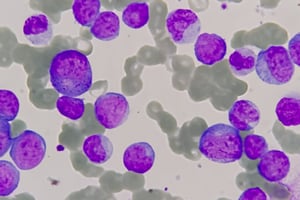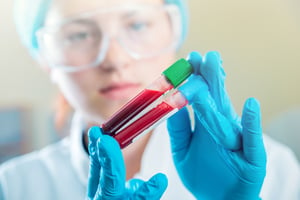Lymphoma Care
Find Your Colorado Lymphoma Specialist
At Rocky Mountain Cancer Centers, both non-Hodgkin and Hodgkin lymphoma patients receive a customized treatment plan using the most advanced therapies available today, including clinical research trials. Our team is by your side for every step of the lymphoma treatment journey – starting with choosing your lymphoma specialist, all the way through ongoing care as a cancer survivor.


Lymphoma Treatment at RMCC Has One Focus: You
RMCC offers more than a lymphoma doctor. At each of our locations across Colorado’s front range, you’ll find a highly specialized lymphoma team that is relentlessly dedicated to your health. In addition to providing cutting-edge, compassionate care, you’ll receive help facilitating all aspects of your lymphoma treatment journey – from imaging and prescriptions to financing and counseling.
Newly Diagnosed with Lymphoma?
A lymphoma diagnosis brings a lot of questions for you and your family. You're probably wondering what to expect in the next weeks and months. Use this guide to prepare for your first oncology appointment.
Types of Lymphoma
Lymphoma is broadly categorized into two main types: Hodgkin lymphoma and non-Hodgkin lymphoma. Beyond that, there are many different subtypes, especially for non-Hodgkin lymphoma.
Non-Hodgkin Lymphoma
The most common type of lymphoma that generally develops in the lymph nodes and lymphatic tissue found in organs such as the stomach, intestines or skin.
Hodgkin Lymphoma
This disease is less common than its counterpart, Non-Hodgkin lymphoma, and tends to affect young adults in the prime of their lives.
Colorado's Lymphoma Specialists
Our Team Is Ready to Help You and Your Family
A hematologic oncologist is the doctor who leads your lymphoma treatment plan. This means they specialize in both hematology and oncology. They work closely with our clinicians and support team to create a personalized lymphoma treatment plan for each patient. RMCC is a member of The US Oncology Network, a collaboration with more than 1,400 independent physicians dedicated to cancer care.
Lymphoma Clinical Trials Through RMCC
Rocky Mountain Cancer Centers plays an important role in developing new and better lymphoma treatments for patients everywhere by participating in clinical research. Our researchers may recommend a clinical trial as part of your treatment plan. Talk to your oncologist about participating in a trial to see if it's right for you.
Helpful Tips and Information About Blood Cancers

Understanding the Difference Between Acute and Chronic Leukemia
Leukemia is a cancer that starts in the bone marrow, affecting healthy blood cell development. There are different types of leukemia, classified by...

How Acute Myeloid Leukemia (AML) is Different from Other Blood Cancers
Blood cancer is a broad category that includes several different types of cancer that start in the bone marrow. As the cancer cells grow, the body...

New Immunotherapy for Non-Hodgkin Lymphoma Subtype Showing Promise
You might not be aware that non-Hodgkin lymphoma (NHL) is actually a large group of blood cancers that encompasses more than 60 different subtypes....

Which Tests Are Used to Diagnose and Stage Non-Hodgkin Lymphoma?
Non-Hodgkin lymphoma is a type of blood cancer that develops in the lymphatic system, part of your immune system. The lymphocyte cells, a type of...

How Bone Marrow Transplants are Used to Treat Blood Cancers
Bone marrow transplants are a special type of treatment that is recommended for patients who have certain types of blood cancers and diseases. While...

Leukemia and Lymphoma: The Differences and Similarities
Author: John M. Burke, MD
Many types of cancers start in blood cells. Two common types are leukemia and lymphoma. The two cancers have much in...

Common Symptoms of Leukemia
Author: Chris Benton, MD
Leukemias are certainly not the most common cancer diagnosed in the U.S., but they are more common than many people realize,...

Hodgkin Lymphoma’s Survival Rate: What to Know About This Disease
Author: Paul A. "Tony" DeCarolis, MD
Named after Sir Thomas Hodgkin, the British doctor who discovered the disease, Hodgkin lymphoma is considered a...

What Are the Signs of Lymphoma?
If you’ve noticed a lump in your neck, under an arm, or in the groin area it’s a good idea to monitor it and check for other symptoms of a blood...